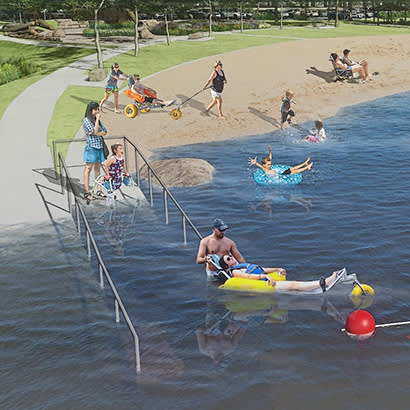
For an enhanced digital experience, read this story in the ezine.
More than 15 percent of the world’s population lives with some form of disability. Disability of any kind requires constant learning, adaptation and patience to overcome barriers to daily roles and routines. Barriers often take the form of social and environmental limitations, such as physical structures and social attitudes that are not welcoming of disability, especially in community-based outdoor spaces.
In central Iowa, Polk County Conservation and other community partners had a vision to eliminate such barriers, inspiring the implementation of a universally designed outdoor space, the Athene North Shore Recreation Area at Easter Lake Park, where accessibility and inclusivity are the primary focus.
To center accessibility, the staff and design team integrated the eight goals of universal design — along with principles of codesign, sustainable design and systematic design — into the building and program creation processes. They created focus groups comprised of individuals who identify as disabled, caregivers of individuals with physical and/or cognitive disabilities, and able-bodied individuals to help finalize park amenities. The team used their feedback to create an initial list of essential and desired park components to meet the needs of all users in relation to entry access and activities, architectural features, awareness, and staffing. This qualitative data then was combined with data collected through a multi-disciplinary literature review and benchmarking efforts to further identify community demographics and park-user needs. Currently, construction is underway and will incorporate the following physical elements and user experiences.
Park Components and Site Amenities
The Athene North Shore Recreation Area will offer both land- and water-
based amenities. Park users will have access to an enlarged beach area equipped with beach access mats and a zero-entry ramp, enabling individuals with limited mobility to enjoy beach amenities and an accessible route to a designated swimming area. Further water-based exploration will be available by way of an accessible kayak launch, adaptive boat and fishing dock, and rowing facility with an accessible dock and boat launch access. On land, an adaptive playscape, outfitted with a splash-pad feature, will foster an inclusive play environment offering graded levels of physical challenge and sensory exploration for children of all abilities.
Community engagement and programming will take place within a large event green space, covered picnic shelters, an event and education building, and an equipment rental building. These indoor spaces will offer two height-adjustable adult changing stations to accommodate a diverse range of toileting needs as well as private, single-user restroom facilities. An indoor designated area of respite also will be located onsite for nursing mothers or individuals who may benefit from a quiet space when feeling overwhelmed or overstimulated.
All park components will be connected by wide paved pathways consistently marked with signage displaying large font, braille and tactile icons to enhance wayfinding abilities for individuals with sensory impairments. Such pathways will originate from the parking lot, an area that will incorporate an increased number of accessible parking spaces for standard vehicles and accessible van use. This exceeds ADA standards, thereby enhancing direct access to all park amenities for individuals with disabilities.
Adaptive Equipment and Programming
To further connect the physical amenities of the park and its users, a fully stocked equipment rental space will provide standard outdoor recreation equipment, as well as a diverse inventory of adaptive options. Adaptive bicycles and tricycles, kayaks, beach wheelchairs, fishing gear and a wheelchair-accessible pontoon boat, to name a few options, along with the necessary related safety items, will enable individuals with physical and/or cognitive disabilities to explore natural landscapes independently or alongside their friends and family. However, the use of adaptive outdoor recreation equipment often requires clinical-based knowledge to ensure safe transfers to/from the equipment and appropriate fit for use. To uphold these safety standards, an occupational therapist is on staff to assist and provide staff training to ensure the delivery of safe, skilled services to individuals who may require adaptations to equipment or activity participation. Such staff also will guide the creation of inclusive programming to encourage community engagement, physical activity and nature exploration through self-led programming, such as a sensory hike or group-based outdoor experiences led by park staff or area organizations serving groups of individuals with diverse physical, cognitive, sensory and/or financial needs.
Devon Boes, OTD, OTR/L, is Program and Outreach Coordinator of the Athene North Shore Recreation Area at Easter Lake Park.

